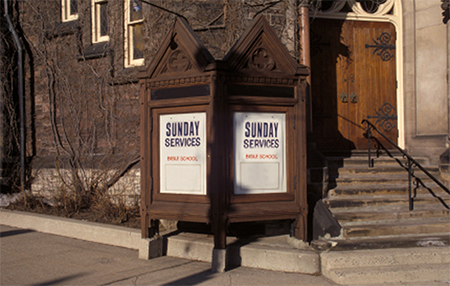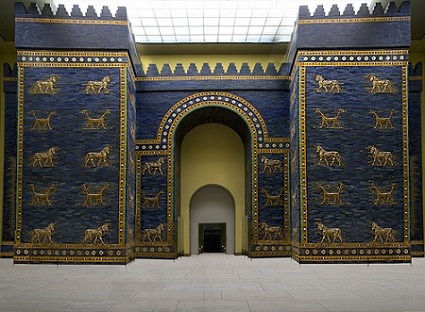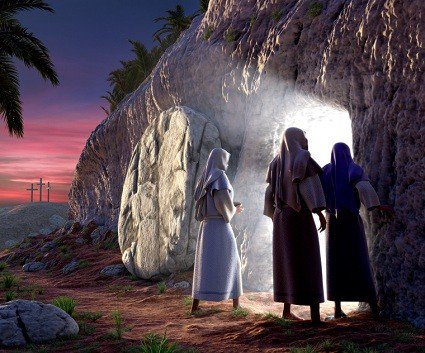
Easter Sunday is the highlight of the religious year for many people. Many dearly beloved traditions are associated with this holiday. Easter Sunday is foundational to modern Christianity. It is the reason why the majority of Christendom worships on Sunday. Entire theologies have been built on the belief that the seventh-day Sabbath was nailed to the cross and the sanctity of Sabbath was changed to Sunday.
 Easter, as the traditional day of Yahushua's resurrection, is the reason given for worshipping on Sunday.
Easter, as the traditional day of Yahushua's resurrection, is the reason given for worshipping on Sunday.
“The Lord's Day — as Sunday was called from Apostolic times — has always been accorded special attention in the history of the Church because of its close connection with the very core of the Christian mystery. In fact, in the weekly reckoning of time Sunday recalls the day of Christ's Resurrection. It is Easter which returns week by week, celebrating Christ's victory over sin and death, the fulfilment in him of the first creation and the dawn of ‘the new creation’.” (Pope John Paul II, Dies Domini, Prologue, 1, p. 1.)
Protestants are quick to follow Roman Catholics in worshipping on Sunday.
"Sunday, the day of Christ’s resurrection and of the appearances to the disciples by the crucified and risen Christ, is the primary day on which Christians gather to worship. Within this assembly, the Word is read and preached and the sacraments are celebrated." (The Use of the Means of Grace, Evangelical Lutheran Church in America.)
The problem is, Yahushua the Saviour was not resurrected on the Sunday of the modern calendar! The confusion has arisen over two facts:
Because the Bible is clear that Yahushua was resurrected on the first day of the week, and since Sunday is the first day of the modern week, the assumption that Yahushua was resurrected on Sunday seems conclusive. However, the modern calendar was not used by the Israelites of Yahushua’s time. It was devised by a Jesuit astronomer, named Christopher Clavius, in 1582. Before that, Europe used the Julian calendar. No days of the weekly cycle were lost when the calendar transitioned from Julian to Gregorian. However, this still does not prove that Yahushua was resurrected on Easter Sunday.
 |
|
An example of a Julian calendar dating from the time of Augustus (63 B.C. – A.D. 14) to Tiberius (42 B.C. – A.D. 37), is preserved on these stone fragments. The eight-day week is clearly discernible. |
The Julian calendar was devised by the pagan astronomer, Sosigenes, in 45 B.C. It had an eight day week. The days of the week were designated by the letters A through H. Yahushua and the Israelites of His day did not use the calendar of their Roman conquerors. They did not calculate the Sabbath or holy feast by the pagan eight-day week. The Israelites used the ancient “mosaic” calendar – the method of time keeping established by Yahuwah at Creation, and reaffirmed to Moses at the Exodus.
On the Creator’s calendar, the weekly cycle restarts every month with the New Moon. Thus, the dates of every month always fall on the same days of the week. Leviticus 23 provides the date for Passover:
“In the fourteenth day of the first month at even is . . . [Yahuwah’s] passover.” (Leviticus 23:5, KJV)
The fourteenth of every lunar month always falls on the sixth day of the week. In the first month, the Passover is immediately followed by the beginning of the Feast of Unleavened Bread.
“And on the fifteenth day of the same month is the feast of unleavened bread . . . .” (Leviticus 23:6, KJV)
This is called a “High Sabbath” because the first day of the feast falls on the weekly seventh-day Sabbath. Yahushua was crucified on the Passover, the sixth day of the week which was called the “Preparation day” for the Feast of Unleavened Bread.
“The Jews therefore, because it was the preparation, that the bodies should not remain upon the cross on the sabbath day, (for that sabbath day was a high day,) besought Pilate that their legs might be broken, and that they might be taken away.” (John 19:31, KJV)
The dates given in Scripture for the crucifixion clearly give dates from the ancient luni-solar calendar. It does not say that the Jews wanted to get the bodies off the cross because it was Day F (the sixth day) of the Julian week. Nor does it say that the next day was Day H – the last day of the eight-day Roman week.
Yahushua was resurrected on the 16th of the first month, called the day of First Fruits. This was also the first day of the lunar week. Paul acknowledged the symbolism of resurrection on the Feast of First Fruits when he stated:
But now is Yahushua risen from the dead, and become the first fruits of them that slept. . . . For as in Adam all die, even so in Yahushua shall all be made alive. . . . Yahushua the firstfruits; afterward they that are Yahushua’s at His coming. (See 1 Corinthians 15:20, 22-23.)
 |
|
Reconstruction of the Babylonian Ishtar Gate in the Pergamon Museum in Berlin. |
Easter was a pagan festival, celebrating the goddess of love and war, Ishtar. Spelled ISHTAR, her name was pronounced EASTER. The heathen rites practiced when celebrating the goddess of love and fertility were among the most degrading in paganism.
The Easter Bunny and colored eggs are ancient fertility symbols that still honor this corrupt goddess.
The pure religion of the early Christians never observed the pagan festivals and they certainly never used them as the basis of when to worship. Apostolic Christians always worshipped on the ancient seventh-day Sabbath, calculated by the luni-solar calendar. It was not until the fourth century that the Council of Nicaea, convened by the pagan emperor, Constantine, passed decrees outlawing the observance of Passover.
“At the Council of Nice [sic.] the last thread was snapped which connected Christianity with its parent stock. The festival of Easter had up till now been celebrated for the most part at the time of the Jewish Passover, and indeed upon the days calculated and fixed by the Synhedrion in Judæa for its celebration; but in future its observance was to be rendered altogether independent of the Jewish calendar . . . .” (Heinrich Graetz, History of the Jews, Vol. 2, p. 563.)
 |
|
Sadly, many Christians do not even question the pagan traditions that they practice. |
Paganism fully triumphed over the Apostolic Ekklesia when the ancient Sabbath was set aside with the acceptance of Easter.
“The Christian [Roman] emperors forbade the Jewish computation of the calendar, and did not allow the announcement of the feast days.” (Grace Amadon, “Historical Basis, Involvements, and Validity of the October 22, 1844, Position, p. 17.)
“This change of the calendar in regard to Easter was attended with momentous consequences. It brought into the Church the grossest corruption and the rankest superstition . . . .” (A. Hislop, The Two Babylons, p. 106.)
From ancient times, Easter had been celebrated on the first full moon after the Spring equinox. “Easter Sunday” is now celebrated by millions on the first Sunday after the first full moon after the Spring equinox.
This transfer of worship from the Bible Sabbath to Sunday in honor of “Easter Sunday” is admitted by Roman Catholics:
“The Sunday...is purely a creation of the Catholic Church.” (American Catholic Quarterly Review, January 1883)
“Sunday...is the law of the Catholic Church alone...” (American Sentinel (Catholic), June 1893)
“Sunday is a Catholic institution and its claim to observance can be defended only on Catholic principles...From beginning to end of Scripture there is not a single passage that warrants the transfer of weekly public worship from the last day of the week to the first.” (Catholic Press, Sydney, Australia, August, 1900)
All who worship on Sunday in honor of “Easter Sunday” as the day of the Saviour’s resurrection are honoring a Roman Catholic institution which itself is based upon ancient pagan fertility celebrations.
“They [the Protestants] deem it their duty to keep the Sunday holy. Why? Because the Catholic Church tells them to do so. They have no other reason . . . The observance of Sunday thus comes to be an ecclesiastical law entirely distinct from the divine law of Sabbath observance . . . The author of the Sunday law . . . is the Catholic Church.” (Ecclesiastical Review, February 1914)
 |
|
There is no Biblical record of the apostles or early Christians celebrating Yahushua’s resurrection except as a fulfillment of the Feast of First Fruits. |
There is no Biblical record of the apostles or early Christians celebrating Yahushua’s resurrection except as a fulfillment of the Feast of First Fruits. They commemorated His death on Passover, the 14th of the first lunar month. They worshipped Yahuwah on the seventh-day Sabbath, the 8th, 15th, 22nd and 29th days of the each lunar month.
“Easter Sunday” remains what it has always been: a pagan fertility celebration. No renaming of it with so-called “Christian” names cleanses it of paganism. All who wish to gratefully acknowledge Heaven’s gift of Yahushua will do so on the anniversary of His death: Passover. They will worship on the seventh-day Sabbath, calculated by Heaven’s ordained system of time-keeping: the luni-solar calendar.
Verily My Sabbaths you shall keep: for it is a sign between Me and you throughout your generations; that you may know that I am Yahuwah that sanctifies you. You shall keep the Sabbath . . . to observe the Sabbath . . . for a perpetual covenant. (See Exodus 31:12-17.)
Today heaven’s call to every sincere Christian is to renounce paganism. Worship the Creator on His appointed day, the seventh day Sabbath.
Related Content: